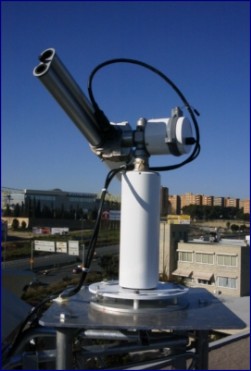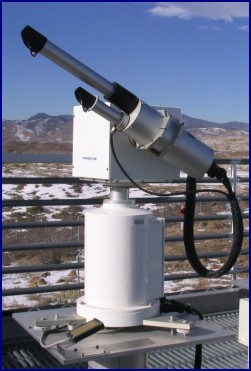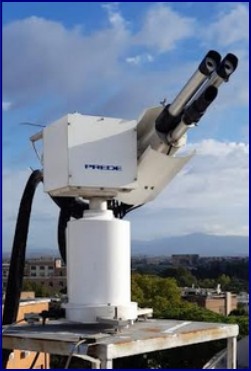CIMEL CE318

PREDE POMs


Stardard istrument of several International Networks (SKYNET-ESR, AERONET) is the sun-sky photometer.
It consists of a light sensor with an amplifier kept in a sealed metal cylinder (or sensor head)
behind a quartz window. A tube for limiting the incident light
reaching the sensor is attached in front of the window.
By the use of a rotating wheel, different interferential
filters can be sequentially
interpose to select a set of wavelengths for measuring incoming radiance.
A programmable robot will aim the optical head at
the different required sun and sky positions.
This basic instrument can be completed
with other features: a thermoresistance for keeping the temperture constant inside the optical head, a diode for keeping the alignment with the sun, solar panels for autonomy, power batteries,
and wet sensors to park the instrument when it rains.
There are several commercially available sky-sun photometers in the international market. The two most well known models are the Cimel Electronique CE318 (produced in France) and the Prede POM (produced in Japan). Both instruments are devoted to atmospheric aerosol characterization and they offer very similar features.



These are the main differences between both network and instrument concepts:
Radiance sensor: The POM model uses only one sensor and tube for both sky and sun measurements. On the contrary, the CE318 uses two different sensors and tubes since 2010. New models of CE318 include now a single detector, but many of the active instruments still work with two sensors.
Temperature effect: Due to sensor dependence on temperature in the NIR band, raw photometric measurements show a significant dependence on temperature. The POM model is equipped with a temperature controlled optical head. The CE318 standard model is not temperature controlled, but the measurements can still be corrected afterwards.
Temporal resolution: CE318 radiometers measure with the AERONET standard schedule, broadly an almucantar scenario every 20 minutes and a direct sun measurement every 10 minutes. The POM radiometers measure an almucantar scenario every 10 and a sun direct measurement every minute, but it can be changed by the user according to the needs.